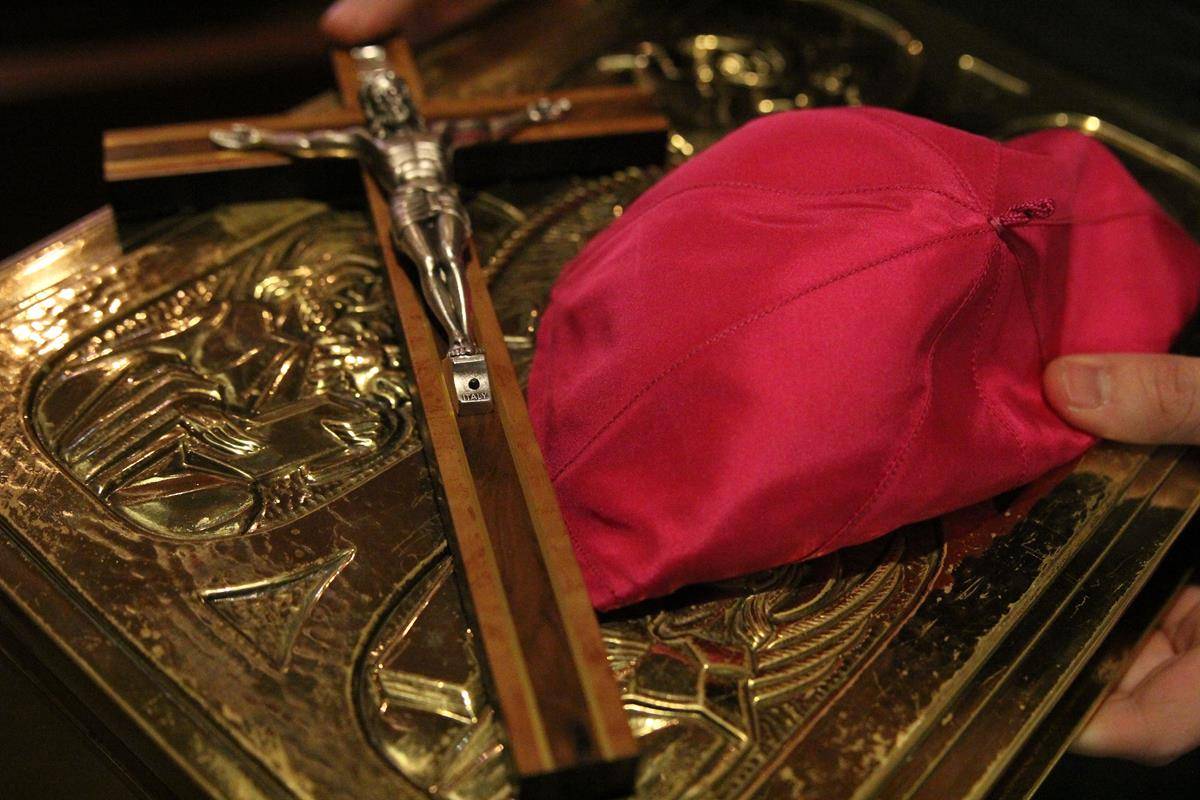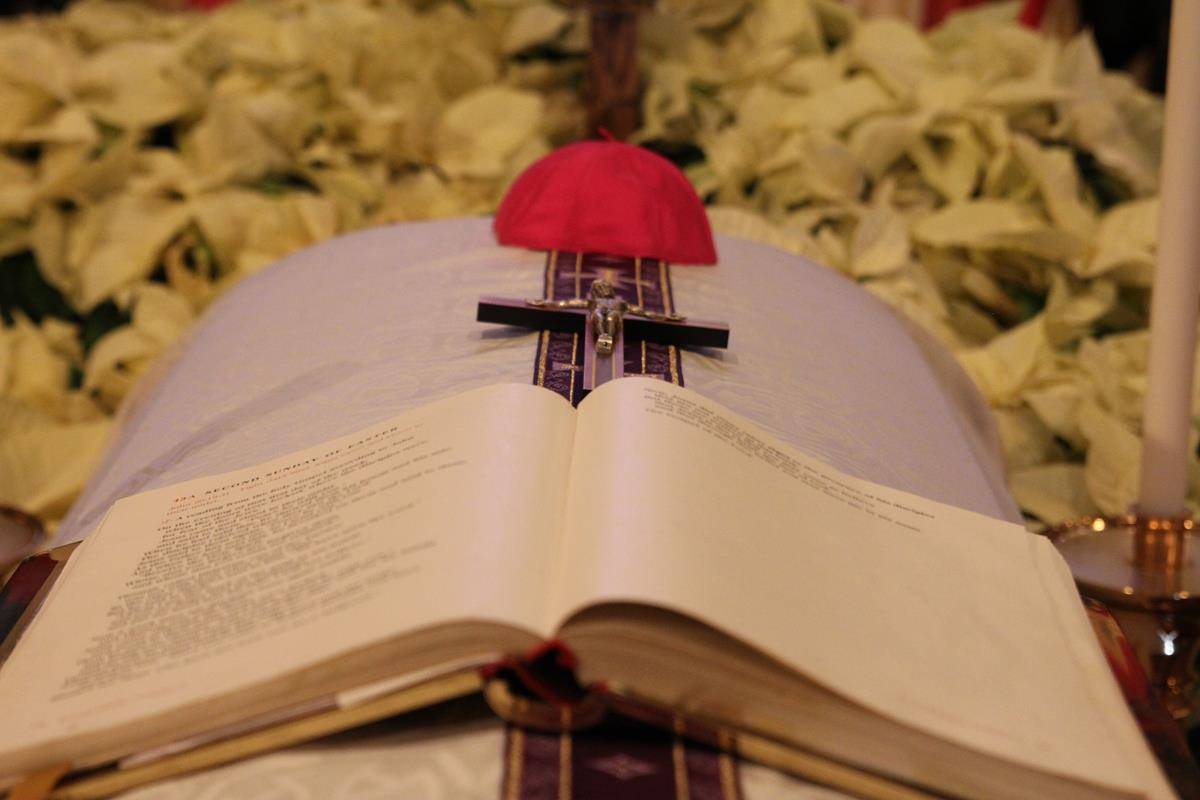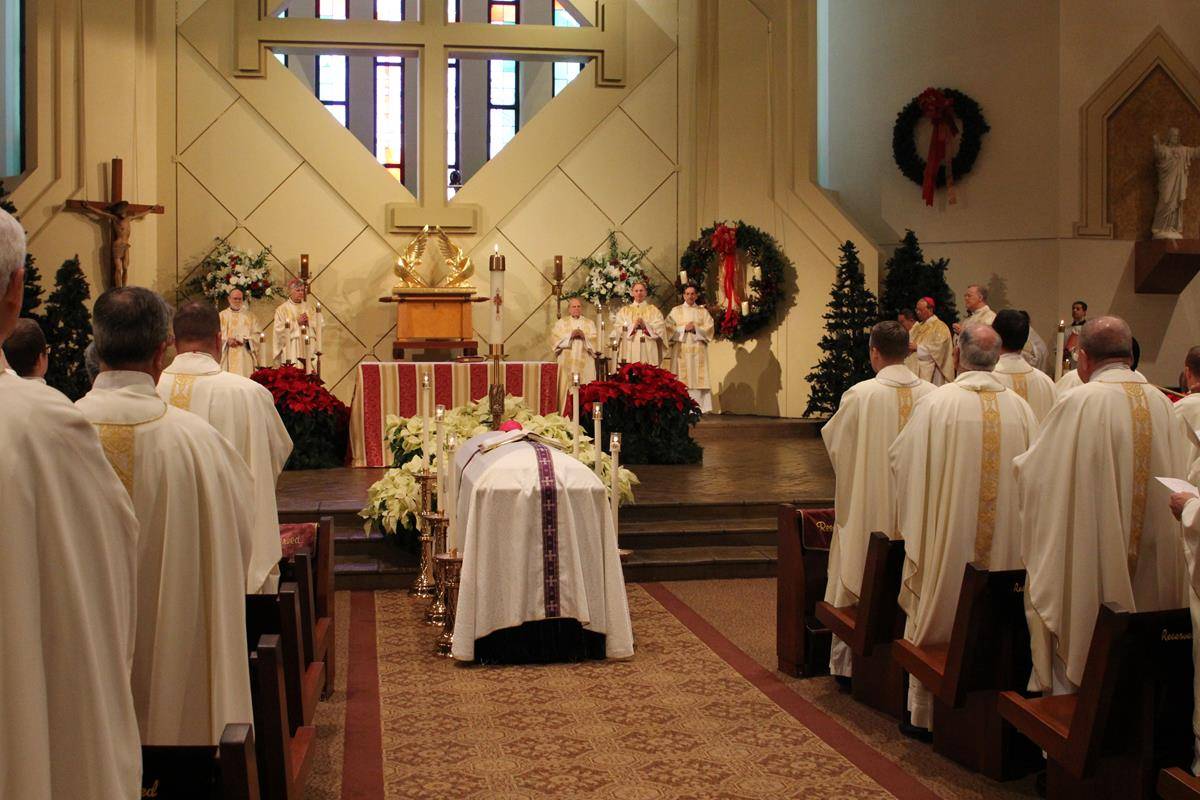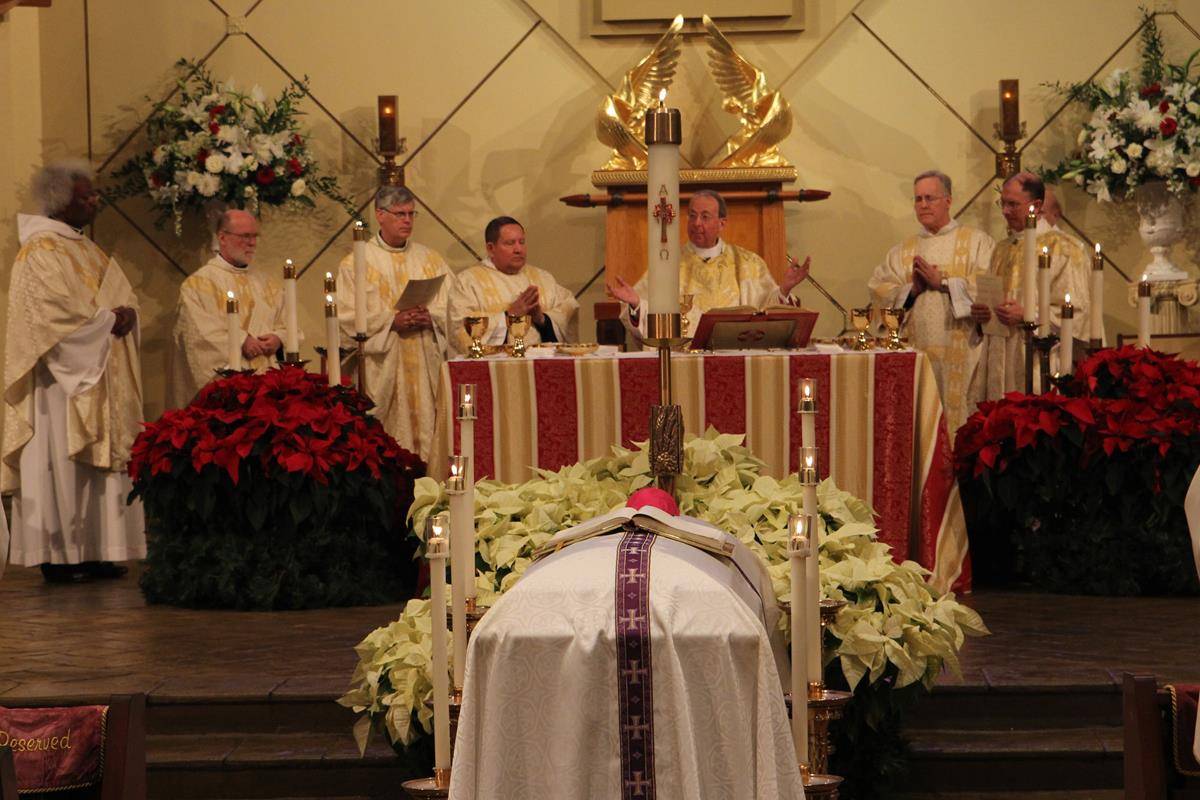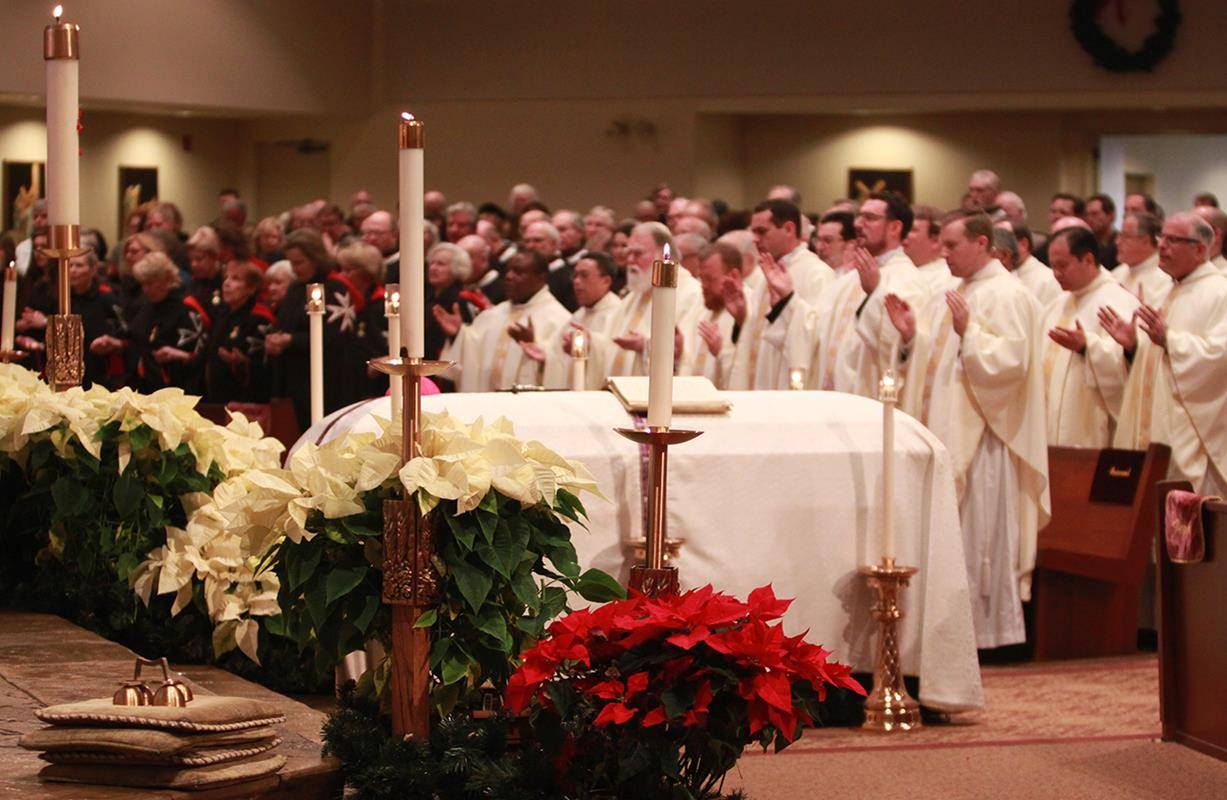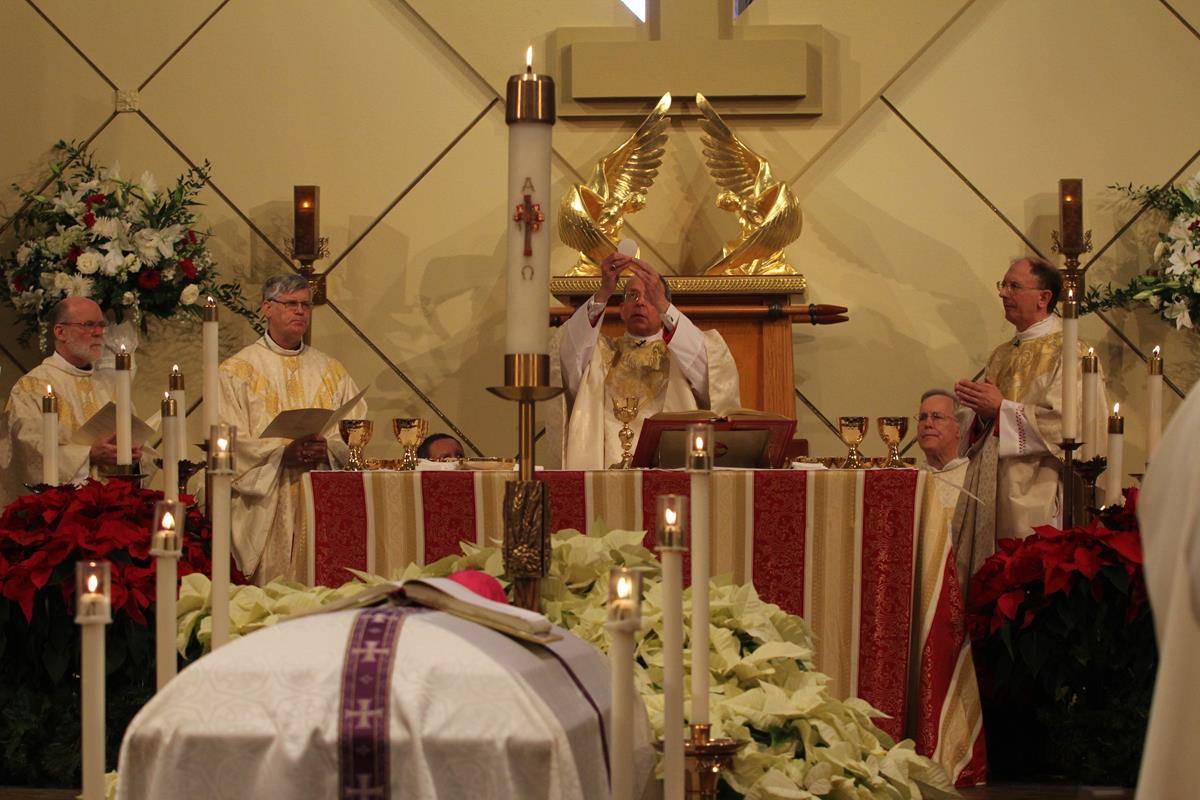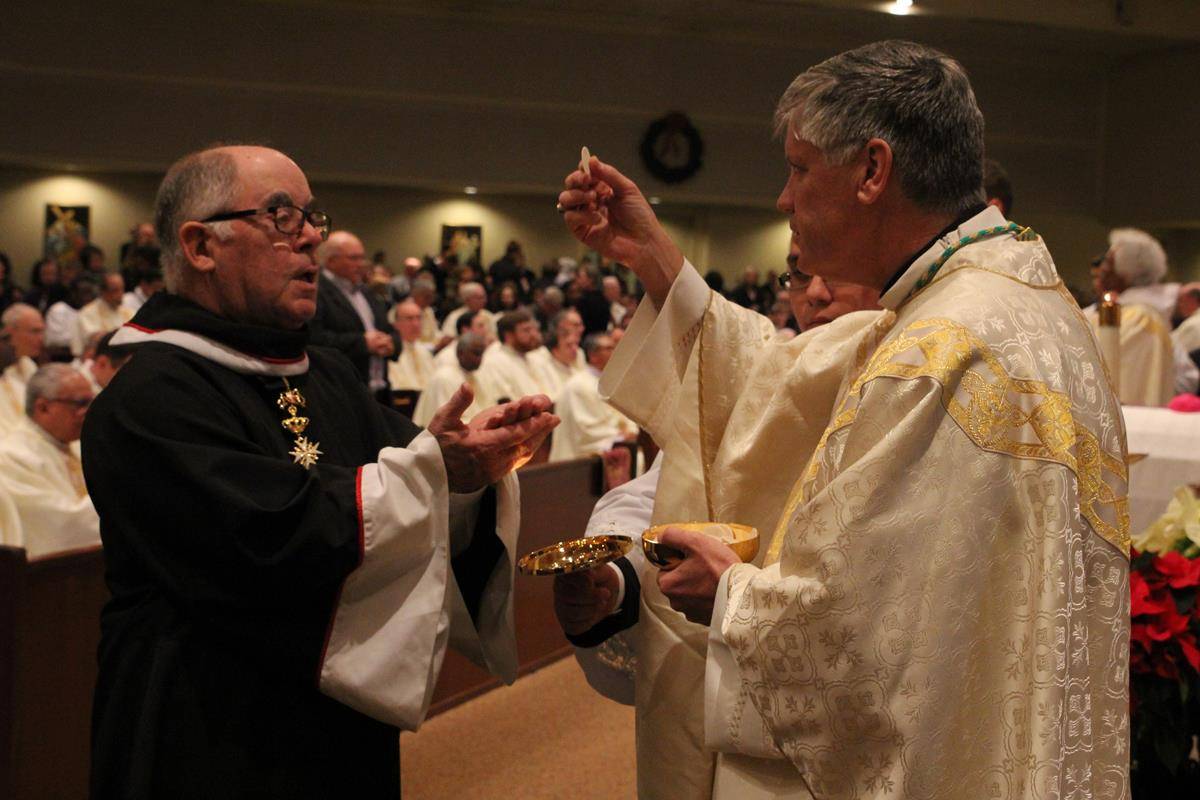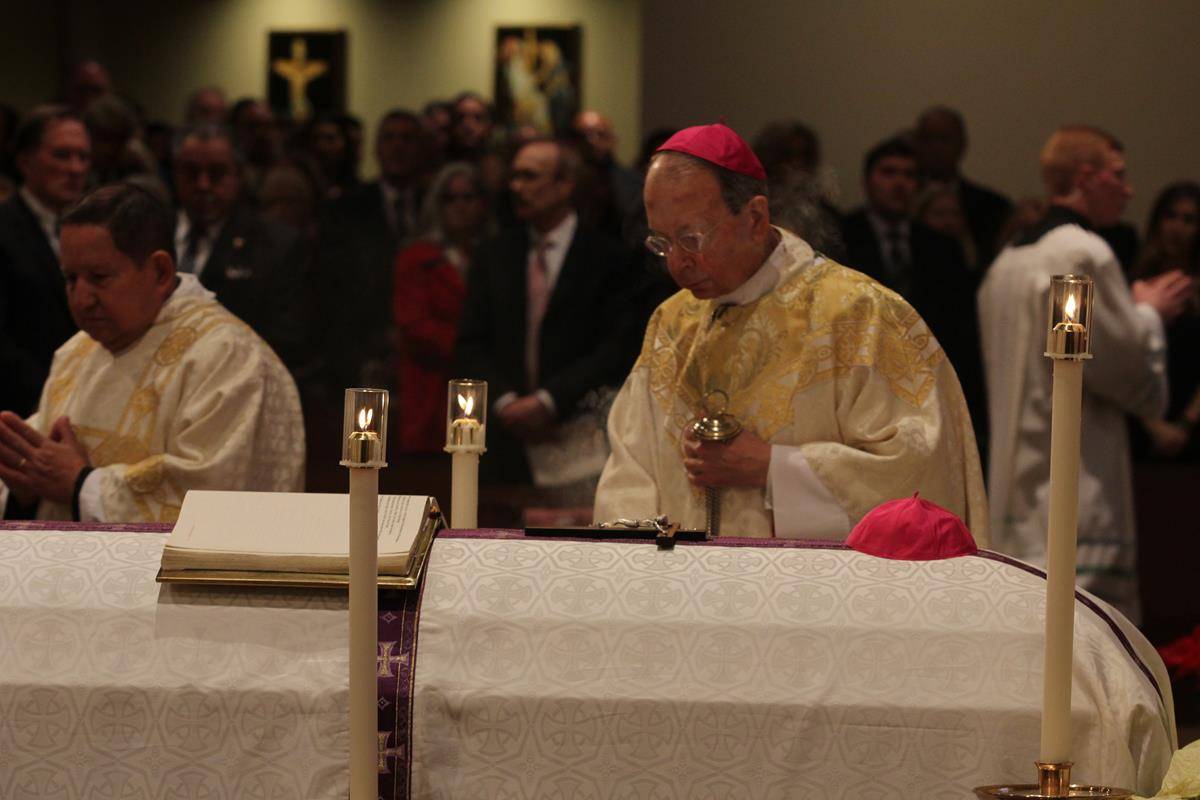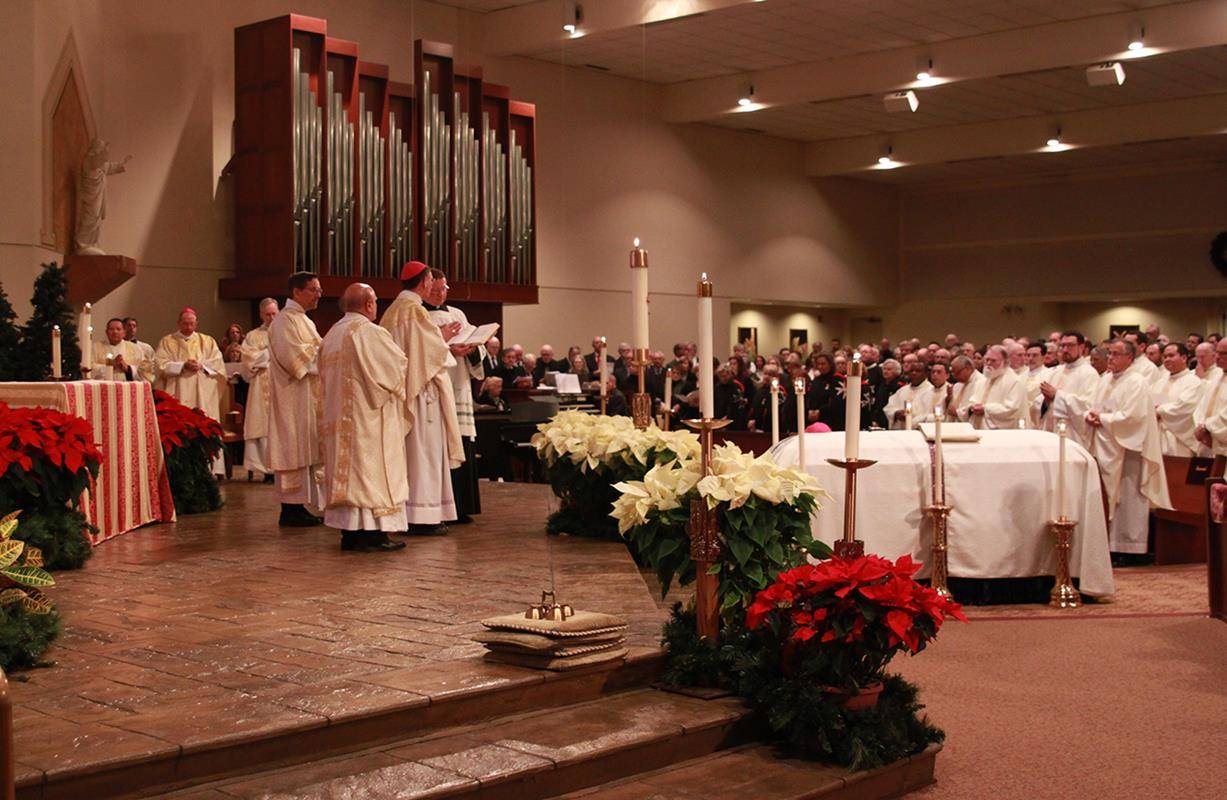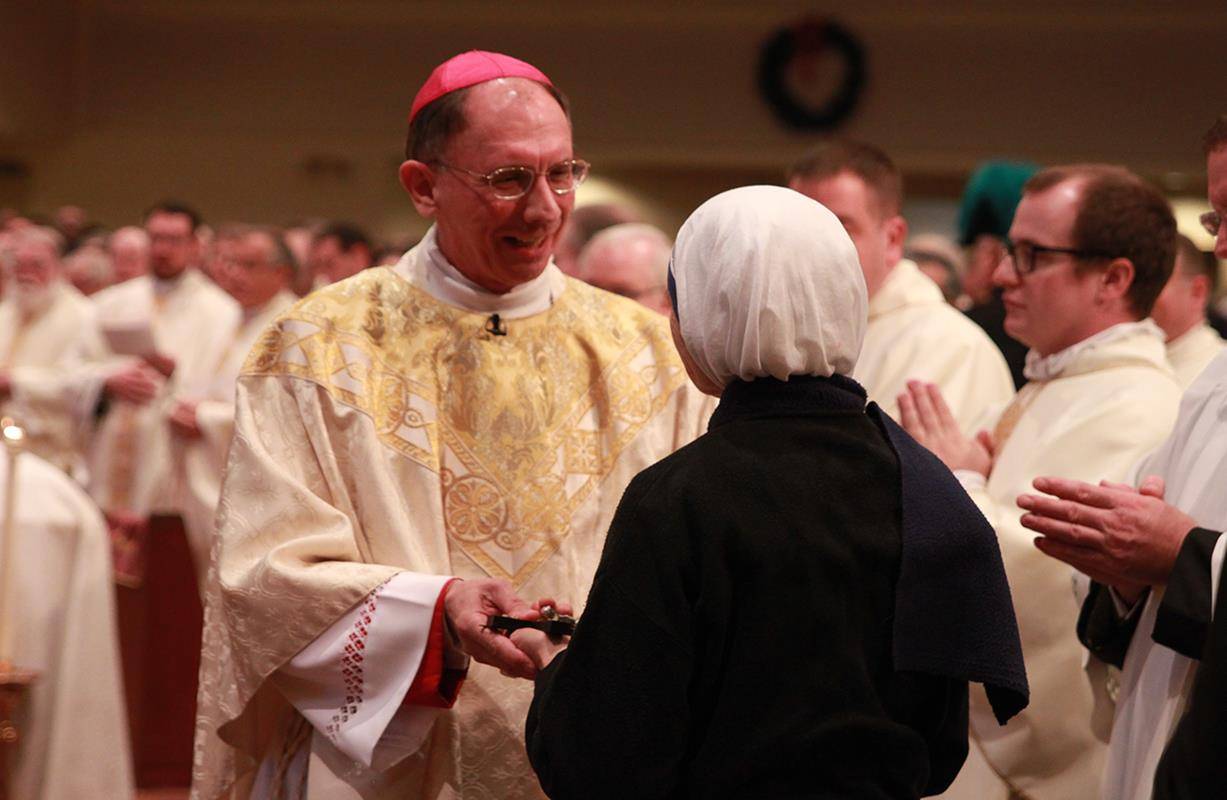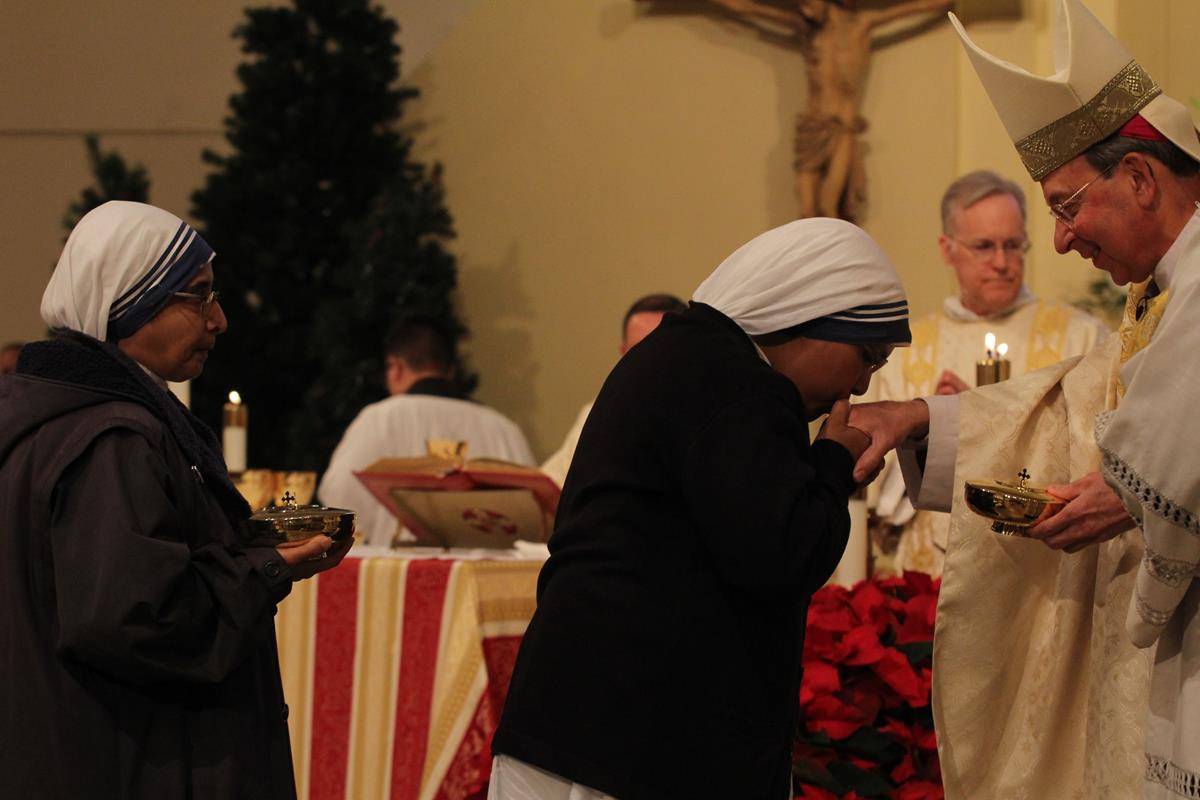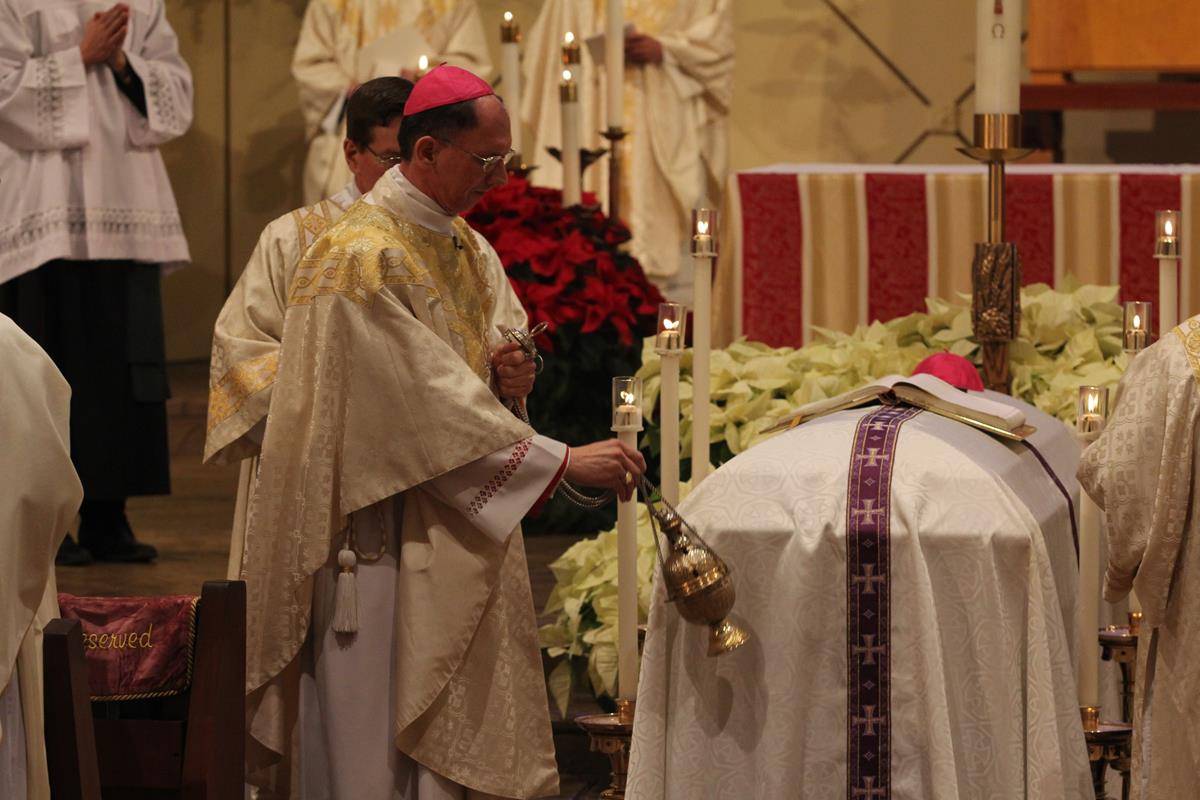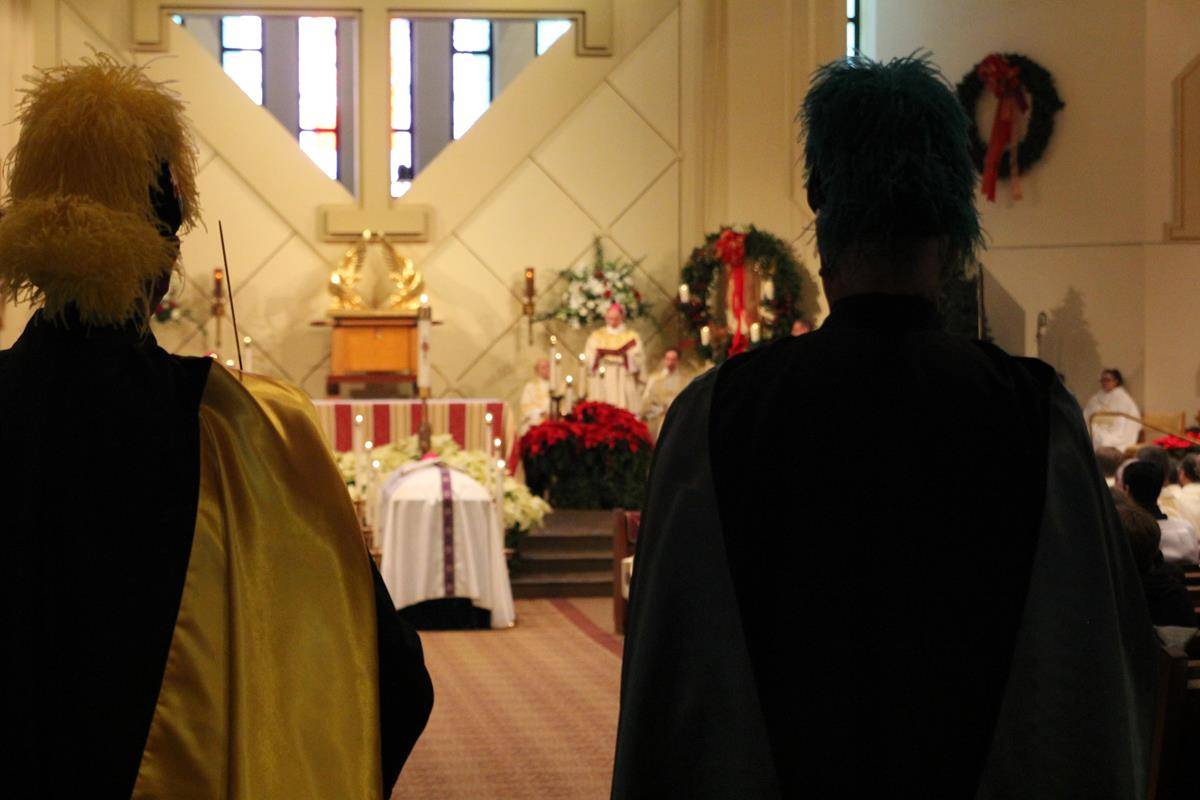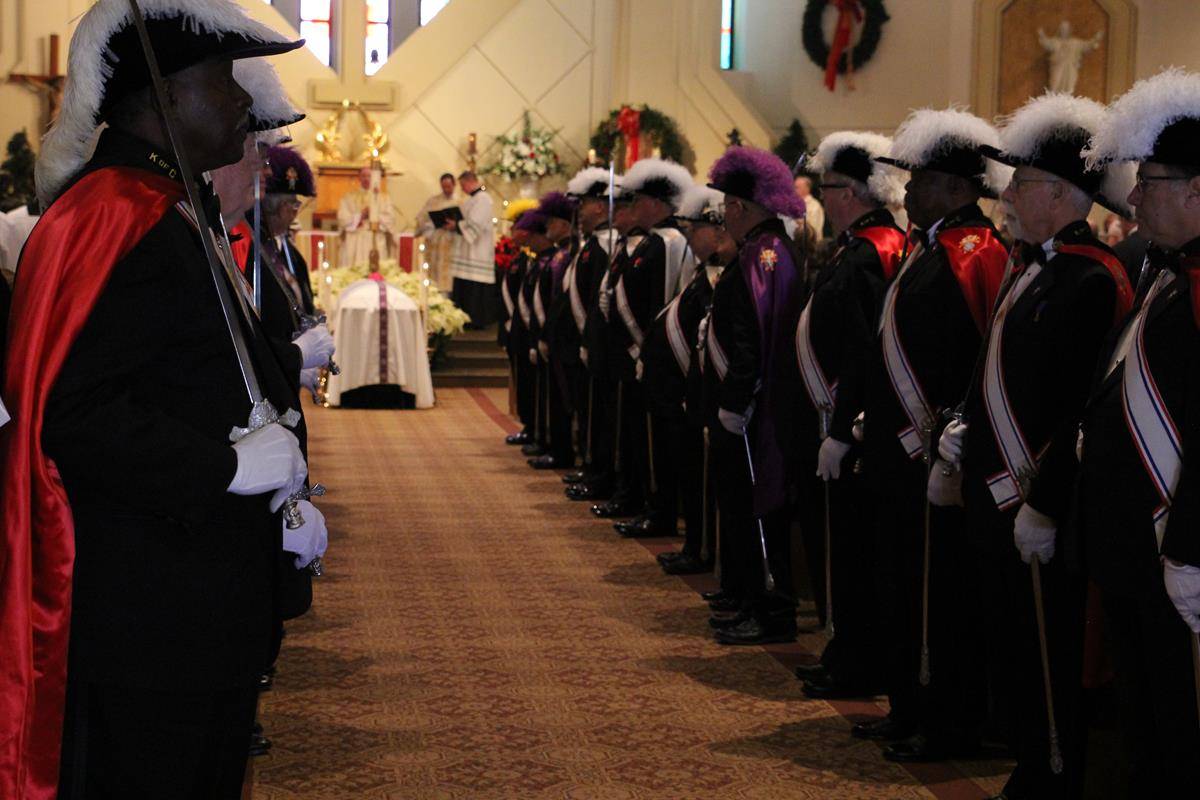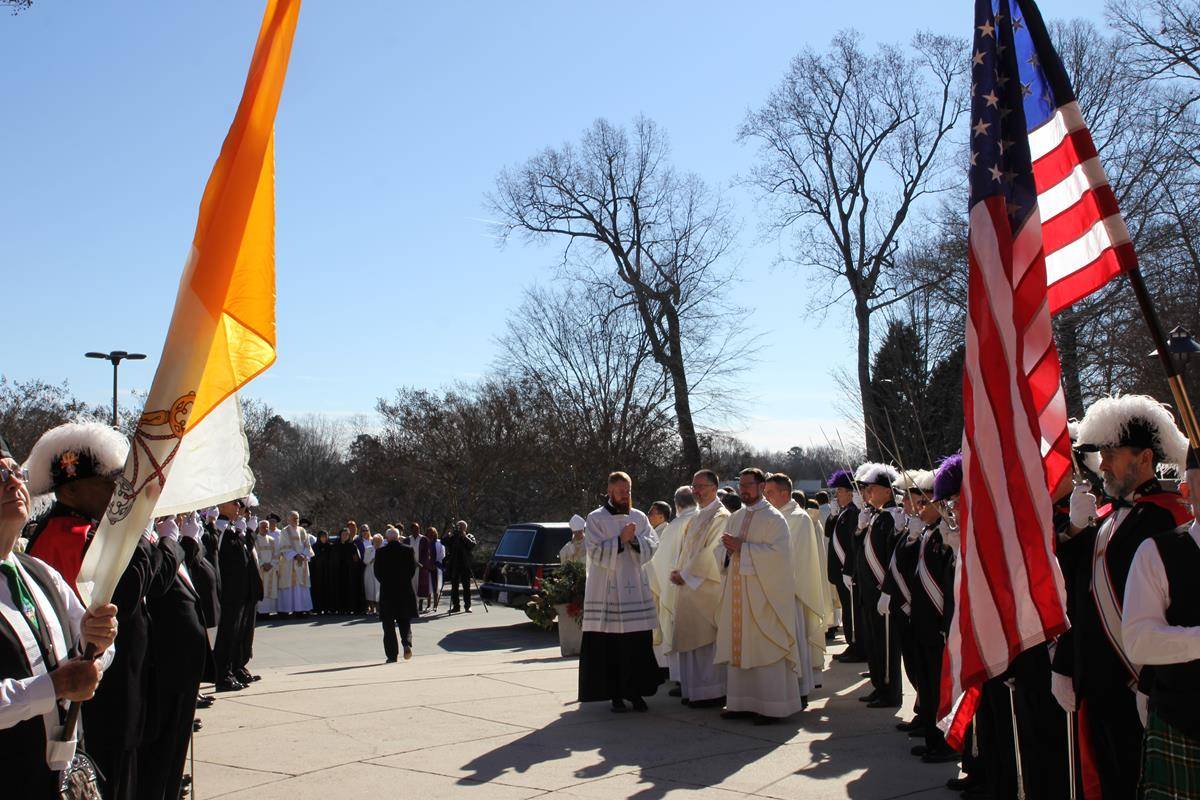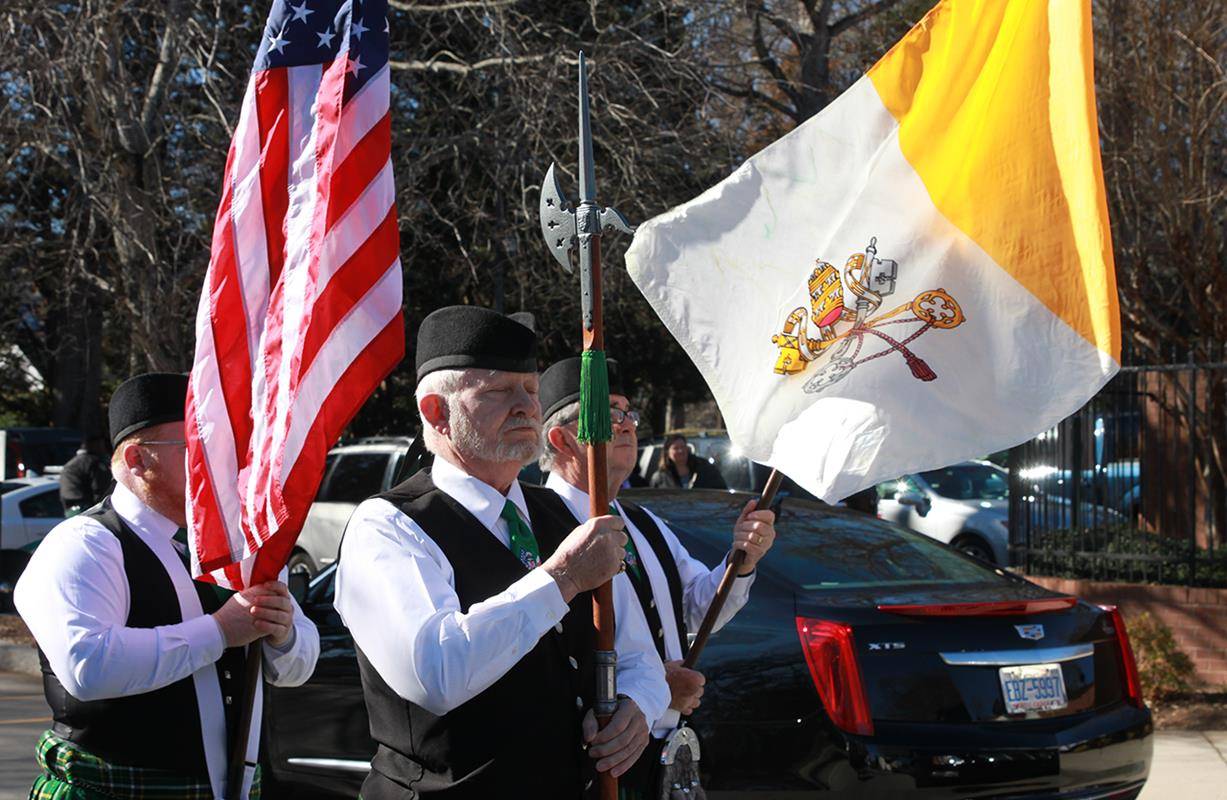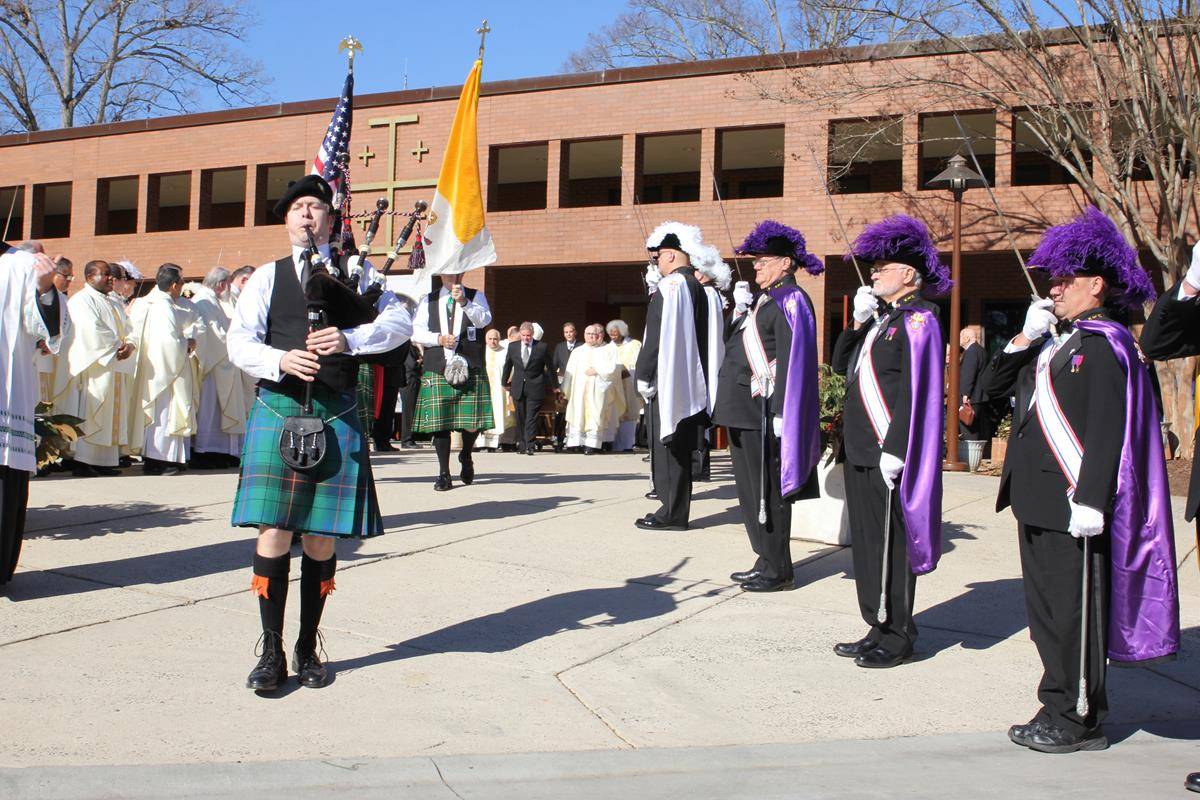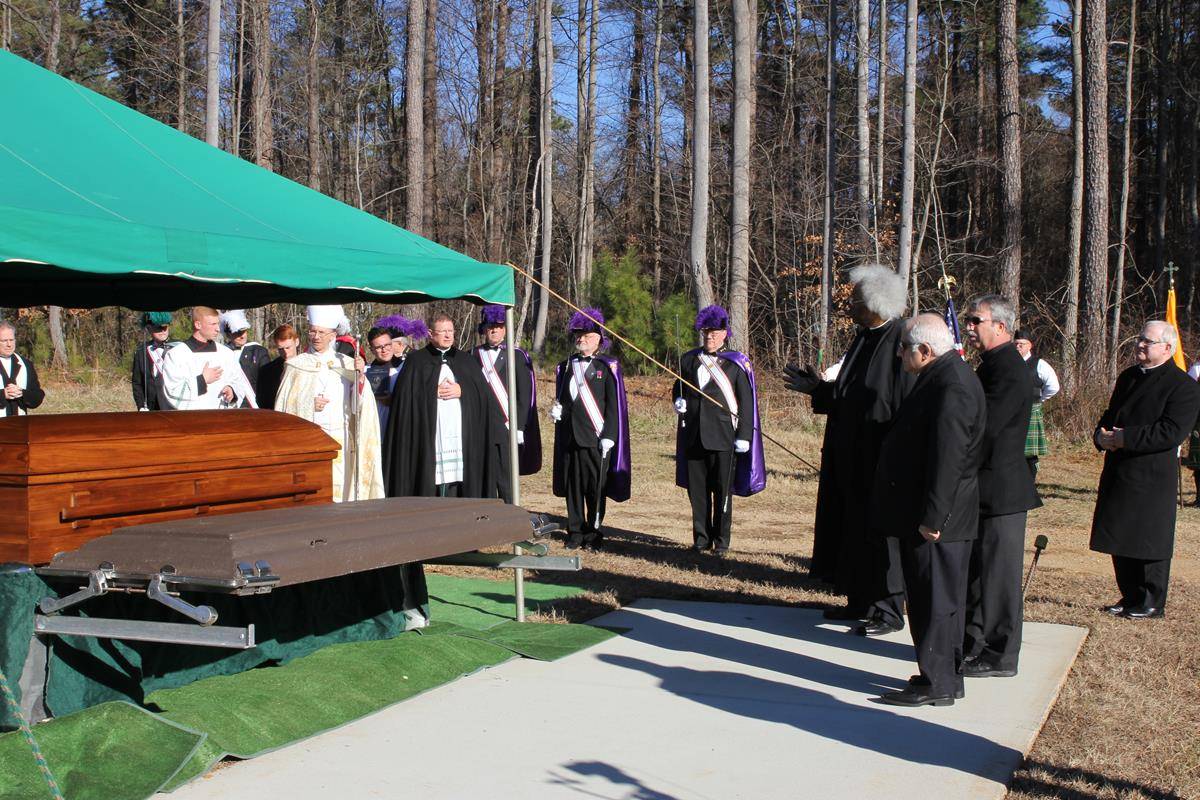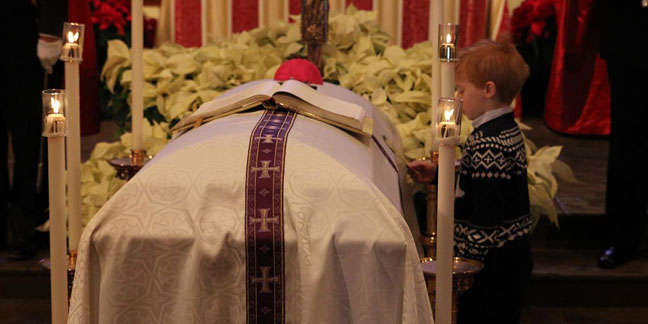
Bishop Curlin remembered during funeral Mass Jan. 2
CHARLOTTE — Joy. Generosity of spirit. Attention to those in need. Friendship. Laughter. A pastor’s heart. Selfless love. The presence of Christ.
These were the gifts Bishop Emeritus William Curlin shared with everyone he encountered during 60 years of priestly ministry, from his first assignment as the pastor of a poor parish in Washington, D.C., to his eight years as the third Bishop of Charlotte, and throughout his lifelong ministry to the sick and the poor before his death Dec. 23 at the age of 90. Read his full obituary.
On Jan. 2, hundreds of friends, family and fellow priests filled St. Gabriel Church in Charlotte to honor his memory and commend his soul to the Lord. A vigil prayer service was also held Jan. 1. Read the story and see pictures.
The church was filled to capacity, with overflow seating at the adjacent parish school, for the funeral Mass. More than 660 others watched the liturgy streamed live online.
Bishop Curlin’s peaceful death just before Christmas was providential, many said, because he loved Christmas so much.
“In his heart, Christmas wasn’t a day. Christmas was a way of life,” noted Monsignor Anthony Marcaccio, formerly the bishop’s secretary and now pastor of St. Pius X Church in Greensboro, in the homily for the funeral Mass.
“He saw good in things, good in people, always looking for Christ in each other, always looking for the hand of God in events and the splendor of creation,” he said. “For him, Christ wasn’t just born 2,000 years ago in Bethlehem, but here and now in the stable of our hearts.”
“To be born in uncomplaining poverty, Jesus, a name that means savior, begins the Paschal mystery. He who will open His arms on the cross offers that open embrace of a child waiting to be loved. In this holy exchange of humanity and divinity, our world is changed forever, with the possibility of new life and a new way of loving. This was the life of Bishop Curlin. This was the basis of his incarnational spirituality.”
“He had so much joy,” Monsignor Marcaccio continued, smiling as he remembered his friend and how much he loved to laugh. “Joy is an indicator of holiness. Joy is the fruit of a life well lived. It is the satisfaction that comes with service and sacrifice if you’re doing the right thing – the Jesus thing.”
Bishop Curlin loved his priesthood and his relationship with Christ, he said, recounting a story about his ordination the bishop had once told him. He and a group of other priests had just been ordained when they encountered an older priest.
“When they first stepped out in all their clerical attire, proud as peacocks, the little priest came by and said to them with kind of a snark, ‘There’s a whole lot of religion on ya, but not much religion in ya.’
“Right then, it became clear to him: If you didn’t have Jesus in your heart, the people of God would see right through your clerics.”
Humility, love for others, and a constant focus on Christ became Bishop Curlin’s hallmarks, Monsignor Marcaccio said.
A prayer card placed on Bishop Curlin’s bedside table said it all, he noted: “Your will, O Lord, nothing more, nothing less, nothing else. Amen.”
Bishop Curlin lived as his close friend Mother Teresa of Calcutta did, serving as the hands and feet of Jesus, praying every night, “Jesus, if you wake me up, I will wake you up in my life,” and every morning, “Come Lord Jesus, walk the earth with me.”
He prayed “not for the edification of Bill Curlin, but in a sort of surrender – that he was willing to take the presence of Christ wherever it was needed that day. Jesus was real and present to him on the journey,” Monsignor Marcaccio said.
“His goal was to think with Christ, to feel with Christ, to have in him the same attitude of Christ,” just as his episcopal motto “Sentire Cum Christo” (“To Think With Christ”) stated.
Long before the phrase became a slogan, Bishop Curlin was challenging others to think: “What would Jesus do?”
“That’s what made him a pastor, that’s what made him a champion of the poor. Well he did it – whether in D.C. or N.C., in the inner city or in Appalachia.”
Monsignor Marcaccio told of encountering a young waiter at a restaurant just a few days earlier who had been confirmed by Bishop Curlin. He and the kitchen staff wanted to know what time the funeral was so they could pray along, because they could not attend. The young waiter remembered his confirmation 17 years ago at St. Matthew Church, and Bishop Curlin telling him that his confirmation name George was also his middle name.
“Imagine that for a moment: In the midst of those massive confirmations, those massive ceremonies, to be able to make a lasting connection in that split second with that kid,” Monsignor Marcaccio said. “Folks who might seem little or least, praying for you – that’s how you get into heaven.”
The Beatitudes, printed on his funeral Mass cards, were the words Bishop Curlin lived by, he said.
“His commitment to the poor and the sick was not heroic social work. It was a fruit of this deep spirituality. He knew that if Jesus walked the earth in him, he should look for Him to do the same in others, especially in the distressing disguise of the poor. Isn’t that how Christ first came to us? Isn’t that how we will be judged by Him in the end?”
Monsignor Marcaccio recalled the Gospel reading for the funeral Mass, Matthew 25:31-46, about serving Jesus in the poor, the sick and the imprisoned.
“One day we will all give an account of how we loved, to Christ. I give thanks for the example I had of incarnational eyes, though clouded by macular degeneration and cataracts, those eyes that could still see – as they always saw – Christ hidden in the poor, hidden in the sick.”
To Archbishop William Lori of Baltimore, who presided at the funeral Mass, Monsignor Marcaccio said, “He was so proud of your ministry. He loved you so very much. I think it was your visit and prayers at the end that told him it was OK to come home for Christmas. And so he did.
“And now, for him, Christmas isn’t a day. It is forever.”
Joining Archbishop Lori in offering the Mass were Bishop Peter Jugis, Auxiliary Bishop Bernard E. Shlesinger III from Atlanta, Benedictine Abbot Placid Solari, and dozens of priests from the Diocese of Charlotte and several religious orders.
Members of lay apostolates and charities that were close to the bishop’s heart – including the Order of Malta, the Catholic Daughters of the Americas, the Knights of Columbus and the Order of the Holy Sepulchre – were present, as well as the Missionaries of Charity and the Sisters of Charity of St. Vincent de Paul.
After the funeral Mass, a bagpiper played as the casket was taken from the church and placed in the waiting hearse. As the Knights of Columbus honor guard stood at attention, all of the priests then came up and, one by one, sprinkled the casket with holy water.
Burial followed in the cemetery at Belmont Abbey, where the first bishop of Charlotte, Bishop Michael Begley, is also interred.
The diocesan Pastoral Center and Charlotte area Catholic schools were closed Jan. 2 so that employees and students could attend the funeral, but Catholic Charities’ food pantry remained open in Bishop Curlin’s honor – handing out food to 11 people in need, some of whom had walked to the food pantry in single-digit temperatures.
— Patricia Guilfoyle, editor. Photos by SueAnn Howell and Patricia Guilfoyle, Catholic News Herald
Archbishop Lori remembers his friend
-
Archbishop Lori remembers his friend
CHARLOTTE — “He loved His own in the world and He loved them to the end.”
These words about Jesus from John 13:1 described Bishop Curlin perfectly, said Archbishop William Lori of Baltimore in remarks at the end of Bishop Curlin’s funeral Mass Jan. 2.
From his first days as a priest at St. Gabriel Church in Washington, D.C., to his last days living in Charlotte, Bishop Curlin exuded the joy and selfless love of Christ.
“Long before Pope Francis spoke about encountering the Lord in one another and accompanying one another, about priests being close to their people, Bishop Curlin lived that reality – no matter what assignment he happened to be in,” Archbishop Lori said.
“No matter what he was doing, Bishop Bill would drop everything, especially when someone was in trouble or distress,” he said. He consoled, counseled and encouraged so many people throughout his life, with “an enormous capacity for friendship, but not just any friendship – but a friendship rooted in Our Lord’s love.”
Archbishop Lori first met then Monsignor Curlin in Washington, D.C., while he was discerning a call to the priesthood and Monsignor Curlin was in charge of diocesan vocations. The two became close friends, and Archbishop Lori was among those at Bishop Curlin’s bedside shortly before his death Dec. 23.
Archbishop Lori recounted several stories about their days in D.C. together, including the time when he experienced chest pains and went immediately to the hospital.
“I think I was still in the emergency room when none other than Monsignor appeared, with the holy oils and the ritual, and the best-ever bedside manner.
“The next day, he walked into my hospital room with my mother, whom he had flown from Louisville, KY., so that she could look after her son. Thankfully I recovered,” he paused, then added with a smile, “I did not die in his arms, and I did not become a retreat story.” The congregation laughed, remembering Bishop Curlin’s love of storytelling and how renowned he was for his spiritual talks and retreats.
Archbishop Lori also recalled early on in his priesthood when his first pastor, one of Bishop Curlin’s closest friends, fired the housekeeper in a fit of temper one day.
“If this firing had been written up in an HR manual, it would be in the chapter entitled ‘Mistakes to Avoid,’” he joked.
The pastor calmed down, then called Bishop Curlin for advice.
“Monsignor Curlin dropped absolutely everything, rushed over to visit his friend and me, the bewildered assistant,” he said. “But he never came empty-handed. He brought a large bag of Roy Rogers hamburgers and fries. And before the end of the evening, he had us laughing at ourselves. He gave his good friend, my pastor, the right advice on how to resolve the situation justly and charitably, and gave me an invaluable lesson about priestly friendship and fraternity.”
“This is why his ministry, I think, seemed to be so spontaneous, even effortless – preaching five-, seven-day retreats, three talks a day and a homily, without a note,” he said. “Being free to go wherever he was most needed, and an uncanny sense of what the real Gospel priority might be in any given situation.”
He radiated Christ and the joy of the Gospel, he said.
“When Bishop Curlin smiled at you, it was Jesus smiling. And when he embraced you, it was the embrace of Jesus.”
“He was born to be a priest, he was born to love, and he loved us to the very end, like Jesus.”
Turning toward the casket in front of the altar, Archbishop Lori paused, then said, “Bill, may your great priestly soul rest in the peace of Christ.”
— Patricia Guilfoyle, editor
Reflection and memories of Bishop Curlin
-
Reflection and memories of Bishop Curlin
From the day he first said “Ad sum” at his priesthood ordination, Bishop William Curlin put into practice every day the true meaning of those words, “I am present and ready,” in his service to the Lord. As a successor of the Apostles by his Ordination as bishop, he continued faithfully to proclaim Jesus Christ, challenging everyone to become saints, to heed the Lord’s invitation to be holy, and inspiring countless numbers of the faithful to a closer following of Jesus. May the good Lord now let the light of His face shine forever upon His servant.
— Bishop Peter J. JugisFifteen years ago, in 2002, Bishop William G. Curlin retired as Bishop of Charlotte after eight years of ministry. Actually, Rome accepted his resignation which had to be submitted upon reaching the age of 75.
For the last 15 years of his life, Bishop Curlin’s home was in the Southpark area in a neighborhood called Beverly Woods East. He lived in a home provided by dear friends who loved and admired the bishop very much. There he lived and prayed, making daily visits to comfort the sick and the dying in the Charlotte area.
In his home, close to where he sat every day, was a famous black and white picture of Abraham Lincoln. The original was taken by photographer Alexander Gardner on Nov. 8, 1863, just weeks before Lincoln delivered his famous Gettysburg Address.
When Lincoln died, Edwin W. Stanton said, “There lies the most perfect ruler of men the world has ever seen. Now he belongs to the ages.” All would cherish his memory. Those who knew him would consider themselves blessed to know such a man. The same is equally true of Bishop William G. Curlin.
When Bishop Curlin was in the emergency room the night of Dec. 16, he was surrounded by friends who were concerned and worried. Bishop told us several times, “I’m not complaining. I’m not complaining.” He was now 90 years old, and had recently celebrated his 60th anniversary of ordination to the priesthood on May 25. He had dedicated his life to helping the poor, the sick and the dying.
Bishop Curlin came to Charlotte in 1994. He was installed as the third Bishop of Charlotte at St. Gabriel Catholic Church. It was in that same church on Jan. 2, 2018, that the faithful gathered to say their goodbyes at his Mass of Christian Burial.
As an auxiliary bishop for the Archdiocese of Washington, he was told once by a demanding cardinal that he would never be an ordinary. The Church up north is different. The faithful may have a cardinal or an archbishop, but the levels of bureaucracy are so many that only a few people ever get to know them personally. In the South, priests and people have many opportunities to know their shepherds on a personal level and to love them.
When Bishop Curlin heard that Pope John Paul II had appointed him a bishop, he called Mother Teresa and told her, “Mother, it’s Charlotte!” We were thrilled to have him. This was what the Diocese of Charlotte needed.
Bishop Curlin spoke about Mother Teresa often in his homilies. His love for the poor and the dying is what made the two of them close friends. He encouraged us to follow her example by helping others. Bishop Curlin also spoke out against the evil of abortion in our country, encouraging us to respect all life from conception until natural death.
At St. Patrick Cathedral, Bishop Curlin came just about every week to celebrate the 11 o’clock Mass on Sundays. People loved him. He celebrated the Midnight Mass on Christmas and another Mass on Christmas Day. He also began the tradition of celebrating Midnight Mass on New Year’s Eve, telling us that it began years ago when he was a priest serving in a poor parish in Washington, D.C. There he would go into the church to pray at midnight and turn on all the Christmas lights. The poor people of the neighborhood would see the lights and come in and join him. What better way to begin the New Year than at Mass.
Bishop Curlin had a great heart. When I told him about families that had lost a mother or a father before Christmas, he told me that he wanted to take the children out so that they could buy whatever toys they wanted. He even took two brothers to a fancy clothing store in the mall so that they could buy a coat for their mother. All of this was on his dime. A few days after Bishop Curlin passed away, a family member told me the little boy who lost his mother years ago and is in college today still has the gift that Bishop Curlin bought him for Christmas.
Yes, now he belongs to the ages. Bishop Curlin lived and died a holy man. We will remember him forever, thanking God that we had the opportunity to know such a man.— Father Paul Q. Gary, pastor of St. Luke Church in Mint Hill
This week, we join with many throughout our diocese in celebrating the life of Bishop Emeritus William Curlin, who died Dec. 23, 2017, at the age of 90. We thank God for the gift of his life, his ministry and his faithful service.
Bishop Curlin loved being a priest and a bishop. For 60 years he sought to know, love and serve the Lord. His pastoral sensitivity endeared him to many who found in both his preaching and ministry a renewed hope.
— Father Frank O’Rourke, pastor of St. Gabriel Church in CharlotteWhen remembering Bishop William Curlin, what comes to mind is the description of Barnabas from the Acts of the Apostles: “He was a good man, filled with the Holy Spirit and with faith.” Bishop Curlin was a kind man with a great compassion for the sick and suffering. He was a good bishop and a good friend. We were blessed that St. John Paul sent him to Charlotte and that he made his home with us.
— Benedictine Abbot Placid Solari of Belmont AbbeyBishop Curlin was first and foremost a Catholic priest. He loved the priesthood. He loved ministering to other priests and he loved being a pastor. The Church is blessed with bishops who possess many different gifts. Different gifts come with different men in different times. Bishop Curlin’s pastoral ministry was his gift. He certainly handled his episcopal responsibilities very well. Although he never sought the episcopacy he was an effective, loving and kind bishop. In many ways, not that you would ever know it, I think being a bishop was a burden to him. He did his duty without complaining but his real love was pastoral ministry to anyone in need.
He once told me that his first year of being an auxiliary bishop in Washington, D.C., was the loneliest year of his priestly ministry. He was removed from the parish life that he loved so much.
But it did not take him long to figure out how to continue his pastoral ministry as a bishop. He was a sought-after retreat master, giving over a hundred retreats while being a full-time pastor or bishop. He gave many retreats to other bishops and many more to priests. It was indeed his pastor’s heart and his pastoral ministry that set him apart, and this was the great gift he brought to us here in Charlotte.
As our ordinary and then as bishop emeritus, he had regular penitents seeking his guidance in spiritual direction and the sacrament of penance. At the Eucharistic Congress he could always be found hearing confessions.
Bishop Curlin was also an ever-present figure in Charlotte area hospitals. I was privileged to be one of many friends who would drive him to confirmations and other events. But it was the sick calls– which to many of us are somewhat awkward – that he somehow was blessed to relish the most. He went to bed each evening only after shaving and laying out his clothes for possible sick calls during the night.
He was gifted in bringing the peace of Christ to the sick, the dying and to the discouraged. It was this same peace that surrounded him in his hospital bed as Bishop Peter Jugis and Archbishop William Lori of Baltimore, among others, offered the prayers of commendation and prayed the rosary over him on the afternoon of Dec. 23. Only a few hours later he quietly and peacefully slipped away to his eternal reward with his friends Abbot Placid Solari of Belmont Abbey and Monsignor Mauricio West, our chancellor and vicar general, sitting by his bed.
Bishop Curlin died in the peace of Christ after having spent more than 60 years as a priest allowing the Christ that lived in him to look for and see the Christ that lived in others.
— Robert GallagherI heard of Bishop William Curlin’s appointment to the Diocese of Charlotte from a Baptist chaplain in the Navy who was visiting St. Meinrad Seminary. He had just arrived from Washington, D.C., where it had been announced. In those days before email and websites, we were somewhat isolated in rural Indiana from news from Charlotte. (The diocesan vocation director, Father Frank O’Rourke, called shortly thereafter to inform us.)
A few days later, I received a letter from my maternal grandmother, who was a native of Washington. She wrote, “The Diocese of Charlotte is truly blessed! I have followed the career of this faithful priest and bishop for many years.” She had worked for the federal government in the early 1970s and often on her lunch breaks went to hear Father Curlin preach at Old St. Mary’s. His spirituality made a deep impression on her.
I was very appreciative when Bishop Curlin granted my request to have my diaconate ordination in my home parish in Salisbury, where I had been an altar server and where I had been confirmed. The parish had been very supportive of me throughout my seminary formation. I still recall the words of Bishop Curlin’s homily as I entered holy orders 23 years ago.
When I was the pastor of St. Vincent de Paul Church in Charlotte, I was privileged to concelebrate a Mass on Christmas Eve with Bishop Curlin for the past 13 years and for his 60th anniversary Mass last May. He was very gracious at the dedication of the parish columbarium, the Ministry Center and Chapel and at celebrations of confirmation. He left us with great testimony of priestly ministry and Christian charity. I know that it was a blessing to know him.
— Father Mark Lawlor, pastor of St. Therese Church in MooresvilleBishop William Curlin was a priest who came to serve. Once when I was at a program at St. Paul’s Church, Bishop Curlin arrived for lunch and instead of being seated at the head table he got behind the line and began serving everyone else. When everyone was served, he allowed himself to be served. It struck me that it was not the first time this had happened, and I thought, “If someone in his position could become a servant, why can’t I serve, too?” That day was an influence in my decision to pursue the permanent diaconate. I will always be grateful to Bishop Curlin for his example.
— Deacon Wally Haarsgaard, Immaculate Heart of Mary Mission in HayesvilleAs a deacon who relocated to the Diocese of Charlotte about nine years ago, I have only known Bishop William Curlin as “emeritus.” That said, I did run into him routinely as he ministered to those in the hospital at Carolinas Medical Center, where I work. I remember once bumping into him in a corridor and asking if I could help him. He quipped, “Nope, not today. Today I’m in for an annual check of my ticker – all is well, good for anther year! And today’s the feast of the Sacred Heart!” On another occasion, we both found ourselves ministering to a priest in the cardiovascular ICU. The priest was still “out” from anesthesia, but Bishop Curlin, knowing the priest’s love of Italian food, said, “Let’s try this, Mark...,” and as he whispered “pasta” into the priest’s ear, the priest awoke with a huge grin! One evening, when I was offering a chapel service at Southminster Retirement Community in south Charlotte, I looked up to see Bishop Curlin among the attendees. Surprised, I asked if he’d like to offer a reflection. “No, no,” he said. “I’ve always enjoyed listening to our deacons – I learn something new all the time!”
— Deacon Mark King, St. Gabriel Church in CharlotteI was one of the permanent deacons ordained by Bishop William Curlin for the Diocese of Charlotte in 2001. I always had the most profound respect and admiration for him. Though I was not a close personal friend of his, he had a way of making one feel that way. He and I corresponded several times concerning my assistance and relationship with several of the retired priests living at Pennybyrn at Maryfield in High Point. Bishop Curlin impressed me with his caring and contact with the retired priests who served with him while he was Bishop of Charlotte. It was also my great pleasure to assist him at Mass on several occasions at the Chapel at Maryfield. I will remember him as a saint of the Church.
— Deacon David King,Pennybyrn at Maryfield in High PointI first met Bishop William Curlin when volunteering in youth ministry in the mid-1990s. I was amazed at how well he seemed to connect with the teens, and I got up the courage to go up and tell him so. I’m not sure I had even spoken to a bishop before. After my words of gratitude, he said to me, “Aren’t you wonderful!” And gave me a big hug. That’s how he endeared himself to so many. Later, when I was still considering the seminary, while he was on a trip to visit seminarians in Philadelphia, he stopped by to visit and anoint my father, who had been recently diagnosed with cancer. He went far out of his way to do it, and when my father passed a little over two years later, he was among the first to call with his condolences. When I called him in August to wish him a happy 90th birthday, he quickly turned the conversation to my new assignment at St. Matthew Church, generous with words of praise and encouragement. I will never forget his kindness.
— Father Patrick Hoare, pastor of St. Matthew Church in CharlotteFor me, this loss is somewhat personal, so it’s all the more saddening. A bishop is, first and foremost, a spiritual father. His primary identity is always to love the people those entrusted to his care and aid their souls by his words and deeds.
In my case, Bishop Curlin gave me, through the sacrament of confirmation, the gifts and fruits of the Holy Spirit. I was in eighth grade and not particularly devout, but in a moment of piety while I prayed, God told me that He wanted me to take St. Simon of Cyrene as my patron because it was my call to help Christ carry His Cross.
After the Mass, Bishop Curlin asked me to remind him which saint’s name I had taken. I told him and he looked quizzically at me, saying, “In all my years as a bishop, I have never heard anyone take him as their patron. Is there a reason you did?” I told the reason that God had given me.
At that moment he smiled, took off his ring and zuchetto (the skullcap), both symbols of his office as bishop. He put them on me and said, “You’re mine now. You’re going to become a priest.”
Through his joy and love, he let me see the beauty of the priesthood, so inviting me into the life that God seems to have intended for me to live. Twenty years later, he is still showing me the beauty of the priesthood.
My love for him moves me to pray that he quickly can behold the face of Our Savior in heaven. Knowing him, rest isn’t what he wants in eternity. If he’s already enjoying heaven, he’s probably just getting started in his new work as a spiritual father – praying for each of us!
— Father Peter Shaw,pastor of St. Joseph Church in Bryson CityI was with him until about 15 minutes before he passed away. I said, “Bill, they are waiting for you in heaven to put that star on the Christmas tree because you always decorate better than anyone else.” He started decorating at Thanksgiving, every year! He always wanted to pass away at Christmas.
— Dr. Mary Ellen Keck, relative of Bishop CurlinHe was a big fan of the Knights of Columbus, a big supporter, and we were of him, too. He was our state chaplain from 2003 to 2005, I believe. He did everything he could for us at every meeting, every chance he got. He was beloved. And he loved our families. We had regional meetings and he would show up and hold a Mass for us. Whatever we asked for, he was there for us.
— Jack Murray, Blessed Sacrament Church in Burlington and Knights of Columbus District Master of N.C., Council 3498
My father was out of the Catholic Church for more than 30 years. I was not raised Catholic. I discerned the call at the age of 21. Years later, I brought my dad in his wheelchair to one of Bishop William Curlin’s preaching missions. My dad was blown away. And then he went to confession with him. Bishop Curlin would call him from time to time. He had such passion and authentic love for the sick. My dad finally came home to the Church. And then my mom became Catholic. This bishop utterly gave everything of himself, to bring Jesus to the people and the people to Jesus. I cannot even speculate how many lives he touched. I am so grateful to be witness to and to hear of too many miracles attributed to Bishop Curlin. Now, he can be reunited with his good friend Mother Teresa. Most assuredly, they are both praying for our souls to carry on, and to join them in eternity.
— Amy IvsanI will add to the litany of tributes to Bishop Curlin. I knew him for about four years as we organized the Charlotte Catholic Men’s Conference. He gave the talk during Holy Hour at multiple conferences. His love for the Eucharist was evident, and he challenged the men each year to not only love and believe in the Eucharist, but to let the light of Christ reflect in us after we received. During the course of my role in the apostolate, there was no bigger supporter than Bishop Curlin. Each year after the conference, he was the first to call to congratulate me, and thank me on behalf of the Church. He listened to my struggles, invited me into his home, provided spiritual direction, and was always totally present when listening to my needs. He was such a wonderful example, always giving himself totally to God’s service, caring for the dying even in his late years. I know many men were touched personally by Christ through him as he heard their confessions during the men’s conference. To me, more than being bishop emeritus, he was a gift from God reflecting His love for me. I thank God for my time with Bishop Curlin and will miss him.
— Dan TrapiniI will miss his gentle spirit of love. He saw Christ in every person. An amazing spiritual leader for us all. Rest in peace dear friend to all, you will be sorely missed.
— Camille Dabney AsmerHe loved Our Lord with all his heart. He was a good shepherd to his flock. May a choir of angels welcome him home.
— Carole Schindler ScagnelliIn the teaching and preaching of Bishop William Curlin, I always felt Christ’s compassion. This was the compassion of the good pastor and bishop with which he tended to the needs of us, the Church of Charlotte. I will always remember him as the good pastor who tended to the needs of those he was called to serve.
— Deacon John Martino,St. Charles Borromeo Church in MorgantonMy funniest moment with Bishop William Curlin was when I was waiting to be incardinated into the Diocese of Charlotte (from Rockville Centre, N.Y.). I was here almost five years and hadn’t been incardinated. Bishop Curlin was with us on retreat up at the conference center. I asked for time to talk to him. I walked in and told him I had been here five years and I had a bishop up in Rockville Centre who said, “Either get in or get back!”
Bishop Curlin said, “What’s the problem? Just kneel down and promise you will be obedient.” I hesitated and he jokingly said, “Oh no, no, no,” just like he would do. So my incardination took place in the chapel of the retreat center.
— Deacon Bill Shaw,St. Joseph Church in Bryson CityBishop Curlin blessed this oil stock I carry with me all the time. It’s the oil of the sick. I bought this a couple of months before my ordination to the priesthood.
Bishop Curlin was in Statesville at St. Philip Church for a confirmation some weeks before my ordination, so I was still a (transitional) deacon. I asked him to bless it. He said, “You’re fully capable of blessing it as a deacon.” I said, “But Bishop, I know how much you care for the sick and how much I have heard you talk about caring for the sick, so for the stock of the oil of the sick that I carry, I would like you to bless it for me.” I have carried it every day since I was ordained.
— Father Benjamin Roberts,pastor of Our Lady of Lourdes Church in MonroeWhen we think of Bishop Curlin’s 60 years as a priest and bishop, we have an overwhelming sense of gratitude. We are grateful that he listened to the call from Jesus, that he responded to His call to be a priest and that he lived a life of selfless service since he was ordained. We are certain that he directly impacted and changed the lives of tens of thousands of people in those 60 years. He has given all those people hope and encouragement and helped them get to heaven.
We just want to relate one particular life he changed through his gift of hope and encouragement. Joan’s mother Dot had oral cancer, and she struggled with it for seven years. Bishop Curlin offered to come visit her. Something about her reminded him of his mother, he said, and he came every single day to visit her before she died.
He told her, “I know you are suffering and I want you to offer it up for other people and unite yourself to Christ. It will give you some meaning, instead of just lying in bed.”
If she offered up her sufferings for those in need, he said, she would do more good for people in the last six months of her life than she did in the first 72 years of her life. He would ask her to pray for specific people every day. That went on for weeks. It really made such a huge difference for her. That message gave her such hope and encouragement until the day she died.
When she died, he celebrated her funeral at the cathedral. He hosted a catered luncheon for us afterwards. To this day we can’t get over how kind he was to us. He didn’t have to do any of that. He had so much compassion.
We never forgot that gift of time, love, hope and encouragement he gave to Dot. Her husband John never forgot his gift to Dot and him. John just died in March 2016 at 95 years old.
Not only did he change the lives of the four of us during those six months but we have shared that message of redemptive suffering with many people through those 18 years. We told those many people what Bishop Curlin told Dot about redemptive suffering, and they knew that if Bishop Curlin said it that they could believe it for their own lives, too. So his message touched hundreds of people’s lives through us sharing his message.
We are thankful that Bishop Curlin continued to serve the people of God, particularly the sick, since he retired. He never stopped loving people and giving them hope and encouragement until the day Jesus called him home.
We love him and we were blessed by him.
— Jim and Joan KelleyBishop Curlin was the presider at our first Rosary Congress in 2009. He was our speaker for the first three years. He loved Our Lady.
— Aida Gamolo, Rosary Congress organizerBeginning in 1994 until his retirement, Bishop Curlin visited Holy Angels each Christmas and offered Mass for the children and staff. He would always say, “This is where I am meant to be on Christmas morning, with God’s most vulnerable children.” He spent a moment with each resident and staff member, offering a special prayer and blessing – for God’s peace and joy to be with them throughout the Christmas season and coming New Year. Bishop Curlin was a wonderful example to all on how to truly live the Beatitudes.
— Mercy Sister Nancy Nance of Holy Angels in BelmontAt Holy Angels, we have had a wonderful relationship with the Knights of Malta. For many years, the Knights and Dames have visited Holy Angels to bless the residents and staff with the healing water from Lourdes. Bishop Curlin always visited with them, his face beaming with love and joy – sharing his love of Jesus with God’s people, who are most in need. Many residents were unable to say “thank you” to him – but they radiated their love and thanks with their most beautiful smiles.
Most recently, in honor of Bishop Curlin’s 90th birthday and in appreciation of his continued support over the many years he shared his compassionate care and love for our residents, Holy Angels was pleased to name the medical clinic the Bishop Curlin Clinic. This recognition was presented to him during his birthday celebration with the Knights of Malta.
Currently in process of being renovated and refurbished, it will allow the many medical specialists our residents require due to their delicate medical conditions, to be seen for their medical appointments at Holy Angels.
— Regina Moody, Holy Angels president/CEOThe passing of Bishop Emeritus William G. Curlin deeply saddened me, and made me reflect on the impact this saintly bishop had in my life.
I had the honor and privilege to be a seminarian for the Diocese of Charlotte from 1998 until the spring of 2002, during Bishop Curlin’s last four years as Bishop of Charlotte. As a seminarian, I had many opportunities to interact with him, and also met one on one with him on several occasions to discuss my discernment process and seminary progress. Prior to becoming a seminarian, though, I had a few opportunities to catch a glimpse of a man I am convinced was a living saint.
My father passed away back in 1988, when I was 24. As I look back in my interactions with Bishop Curlin, I now realize that he was, in many ways, like a second father to me.
I remember the very first time I met him. It was at St. Patrick Cathedral in Charlotte for the Solemnity of the Immaculate Conception, Dec. 8, 1995. Bishop Curlin was the main celebrant, and I recalled his homily really resonated in my heart – he preached on Our Lady’s total surrender to God’s will, and of course he threw in a couple of Mother Teresa’s anecdotes. I wasn’t really practicing my faith at the time, and his homily made me take a hard look at my spiritual journey. After the Mass, I thanked him for saying Mass for my girlfriend at the time and myself. He was very gracious and promised to pray for me and the young lady I was dating.
Three weeks later I had a conversion experience while on vacation in Florida. I came back to the faith with a force the following year. I broke up with my girlfriend and started discerning a priestly vocation. Although I considered joining a religious order, a diocesan priest who mentored me at the time suggested I speak with Bishop Curlin. I met with the bishop and I mentioned to him that I was considering joining the Vincentian priests. He responded, “The Vincentians were founded by St. Vincent de Paul; the Diocese of Charlotte was founded by Jesus Christ!”
The fall of 1998, I joined the seminary program and was sent to St. Vincent de Paul Seminary in Latrobe. Although I discerned not to continue my seminary studies, I met with Bishop Curlin and thanked him for the spiritual and academic formation I received while in seminary. I told him I wanted to get married and start a family. He told me that for me to find the right woman, she had to be a woman I was willing to lay down my life and die for.
Three years later, I did get married and my wife and I had a lovely daughter, who is now 12.
After Bishop Curlin retired, I occasionally bumped into him around town. About four years ago, I ran into him at the grocery store and helped him “u-scan” a birthday cake he was struggling to ring up. Bishop thanked me and asked what I was up to at the time. I told him that I was applying for a job with the Catholic News Herald, but I hadn’t heard back from them yet. He thanked me again for my help and then told me, “I will offer my Mass for you tomorrow.”
Three weeks later, the Catholic News Herald editor called me and offered me the job.
As a reporter for the diocesan paper, I had several opportunities to interview Bishop Curlin, but the last time I did have a chance to chat with him remains very special. SueAnn Howell, senior reporter, and I were asking him about his long-time friendship with now St. Teresa of Calcutta. He shared with us that Mother Teresa loved ice cream. When I asked him what she would say to him when he makes it to heaven, he quipped, “Let’s have some ice cream,” he said laughing. “I like ice cream, too!”
Like Bishop Curlin, my father had a great sense of humor, and made a lasting impact in the first 24 years of my life. Like my father, Bishop Curlin made a lasting impact in my life the last 22 years. Like Bishop Curlin, my father also died on a Dec. 23.
— Rico De Silva, former Hispanic communications reporter for the Catholic News HeraldBishop Curlin came to our parish years ago and asked us to bring back an old fast of abstaining from eating meat on Fridays to aid in the end of abortion. My family had always done this, but it was so good to hear a bishop ask us to rekindle this fast for such a worthy cause! Also, I had the honor of him being my confessor one time at our Eucharistic Congress. I had no idea who my confessor would be as I waited in line. When my time came, the empty chair was next to Bishop Curlin and I almost didn’t go in – so glad I did! He was a most humble confessor with such simple perfect direction!
— Amy TarrSuch a blessed, holy and wonderfully down-to-earth man. He will be sorely missed among his church community on Earth. May angels speed you to paradise, Bishop Curlin.
— Regan White Craig
Bishop Curlin was the presider at our first Rosary Congress in 2009. He was our speaker for the first three years. He loved Our Lady.— Aida Gamolo, Rosary Congress organizer
Beginning in 1994 until his retirement, Bishop Curlin visited Holy Angels each Christmas and offered mass for the children and staff. He would always say, “This is where I am meant to be on Christmas morning, with God’s most vulnerable children.” He spent a moment with each resident and staff member, offering a special prayer and blessing – for God’s peace and joy to be with them throughout the Christmas season and coming New Year. Bishop Curlin has been a wonderful example to all on how to truly live the Beatitudes.— Sr. Nancy Nance, RSM, Vice President Community Relations at Holy Angels
At Holy Angels, we have had a wonderful relationship with the Knights of Malta. For many years, the Knights and Dames have visited Holy Angels to bless the residents and staff with the healing water from Lourdes. Bishop Curlin always visited with them, his face beaming with love and joy – sharing his love of Jesus with God’s people, who are most in need. Many of the residents were unable to say “thank you” to him – but they radiated their love and thanks with their most beautiful smiles.Most recently, in honor of Bishop Curlin’s 90th birthday and in appreciation of his continued support over the many years he shared his compassionate care and love for our residents, Holy Angels was pleased to name the medical clinic – the Bishop Curlin Clinic. This recognition was presented to him during his birthday celebration with the Knights of Malta.
Currently in process of being renovated and refurbished, it will allow the many medical specialists our residents require due to their delicate medical conditions, to be seen for their medical appointments at Holy Angels.
— Regina Moody, Holy Angels President/CEO
“We were so very blessed to have Bishop be a part of our family for the past 22 years. Ed was his doctor and I was his nurse, but, more importantly, we all became part of his "family", as he called close friends. We have so many fond memories.
He had such a pure heart! I often told him that what I loved the most about him was that he was so generous with God's mercy.
Bishop Curlin was never intimidated by the mess people had made of their lives, because he was entirely certain that God's mercy would provide relief and comfort and restoration. He was undaunted by situations because he knew God would remedy it all if we asked forgiveness and prayed.”
— Ed and Paula Knish. Ed was one of the lectors and they brought up the gifts at the funeral Mass.
“We were so very blessed to have Bishop be a part of our family for the past 22 years. Ed was his doctor and I was his nurse, but, more importantly, we all became part of his "family", as he called close friends. We have so many fond memories.
He had such a pure heart! I often told him that what I loved the most about him was that he was so generous with God's mercy.
Bishop Curlin was never intimidated by the mess people had made of their lives, because he was entirely certain that God's mercy would provide relief and comfort and restoration. He was undaunted by situations because he knew God would remedy it all if we asked forgiveness and prayed.”
— Ed and Paula Knish. Ed was one of the lectors and they brought up the gifts at the funeral Mass.
“In all of the many years that we have known Father Bill, we have witnessed firsthand time and again how he touched the lives and hearts of everyone that he encountered.
So often he was called to celebrate someone’s greatest joys or to comfort someone in their time of deepest sorrow. Whenever he was called, he was truly present and he gave of himself wholeheartedly. He always set the needs of others before his own. His smile and his laughter were contagious and he was a masterful storyteller.
His life experiences and parables made us want to be better- better people, better servants of Christ. He was a light and a beacon of hope to us all, a true disciple of Christ, and he lived out his episcopal motto “to think with Christ” every moment of every single day. His life was a constant prayer of faith, of joy, of gratitude.
He showed us through his heart-filled example how to truly love all of our neighbors as ourselves and to give God the glory in all things- whether great or small. He emulated Christ’s compassion, His humility, His mercy, and His love for all of creation.
We were always in awe of how animals could even sense his joy and his peaceful nature. His backyard was always a safe refuge and home to countless deer, rabbits, squirrels, and birds who came to share in his kindheartedness. There will be no other like Father Bill. He blessed us beyond measure and he will forever be so dearly missed.”
— Sharon and Jim Mattei
Read part of Monsignor Marcaccio's homily
-
For Bishop Curlin, Christmas wasn’t just one day
Editor’s note: Following is a partial transcript of the homily delivered by Monsignor Anthony Marcaccio, pastor of St. Pius X Church in Greensboro, at the funeral Mass for Bishop Curlin Jan. 2:
To all the priests gathered here: Bishop love his priesthood and I hope you know that he loved your priesthood. He said to me more than once in the evenings, after all the ceremonies, that it was at ordination that he felt most a bishop...To our permanent deacons: The bishop personally identified with the diaconal service and in the Archdiocese of Washington was instrumental in the restoration of the permanent diaconate many years ago.
To all those in consecrated life, to all of our beloved brothers and sisters, our religious: You were all brothers and sisters to him. And with his great love of nature, seeing the hand of the Creator and the beauty of creation here in North Carolina, he affiliated with the Franciscan order. A lot people don’t realize that. Father Remo Di Salvatore, who is here today, who was ordained by the bishop many years ago, is now the provincial of the Capuchins. Last night he and I placed a Franciscan cross in (the bishop’s) sleeve. Bishop lived and loved beautiful, artistic, excellent and elegant things – not because of their intrinsic value, but because of the sentimental value. They reminded him of family and friends. So he appreciated art, he appreciated so many things. Although Bishop did not take a vow of poverty like you, he lived so simply. Sleeping, as long as I knew him, on a hard twin bed frame. Cooking our meals at home and doing the laundry, constantly doing the laundry! It was a sacramental, but it was also a sabbath ... He would go down to the basement of the big house and there he would do laundry. I think there is where he thought; it was like a Bethany for him. So I let him do mine, too!
To all of us who minister in the Church, I am reminded of the challenge he received as a seminarian. (We are so blessed to have seminarians, and we need seminarians and we need priests so desperately in our diocese, in our Church.) The challenge he received as a seminarian from a Sulpecian priest ... When they were first decked out in all their clerical attire, proud as peacocks, and the little priest came by and said to them with kind of a snarl, “There is a whole a lot of religion on ya, but not much religion in ya.” Right then it became clear to him: if you didn’t have Jesus in your heart, the people of God would see right through your clerics.
On Sunday after vesting the bishop for this liturgy, we stopped for dinner – imagine me stopping for dinner! – and a little lady came to the table. She might be here right now. She came out of the kitchen ... to us to offer her condolences, and to ask what time the Mass was because those folks in the kitchen wanted to know what time the funeral was so they could pray with us.
A young waiter came up to us ... and asked if we were Catholic priests. “Yes,” we said, “We’re here for Bishop Curlin’s funeral.” He said, “I thought so.” He said, “He confirmed me at St. Matthew’s (a huge parish, as you know) in the year 2000.” He knew the year! He said, “I took the name George.” I said, “That was Bishop’s middle name.” He said, “I know that. He told me that at the confirmation.”
Now I want you to imagine that for a moment: in the midst of those massive confirmations, those massive ceremonies, to able to make that lasting connection in that split second with that kid. Oh, to have folks who might seem little or least in this kingdom, praying for you – well that’s how you get into heaven.
With all the illustrious company that we have in this room, we know that a lot of people who would like to be here can’t be here because they are working hard. So for them and to all the faithful here and for those who are watching, just know that he loved you so much. And we pray that you feel, we hope that you feel the power of this communion of prayer today.
I recognize today also the Catholic Daughters who are present. He was a former national chaplain. I recognize the Ancient Order of Hibernians. He was not an Ancient Hibernian; in fact, he wasn’t really Irish. People think that he was Irish, but Curlin was a German name. He kind of looked Irish – there is a little bit of Irish in each one of us. ...
To the Knights and Ladies of the (Order of the) Holy Sepulchre here: You shared Bishop’s deep concern for the Holy Land, and the plight of our Christian brothers and sisters there, as we work for peace that’s based on justice.
To the Knights of Columbus: Thank you, thank you, thank you. Thank you for being in solidarity with the priests. Thank you for being so kind to the bishop in this funeral liturgy, and standing in vigil with him. Thank you for your promotion of vocations that he loved, and supporting our seminarians, and thank you most of all for your fraternal service to the Church and to this great nation. And I want to thank you in a special way for all the rubber chicken dinners that we ate at your conventions!
To the Knights and Dames of (the Order of) Malta: The points on your habit, the points on the cross of your habit, represent the Beatitudes. The Beatitudes are included on his funeral Mass card. Your ministry, your call, your mission, your religious order that is dedicated to defending the faith and serving the poor, resonated with his ideas. Especially the sick – the sick always had a special place in his ministry and in his heart. Perhaps because of his own severe illness as a child, and perhaps just because of his priestly heart. We all know he was tireless in hospital visitation. And every year he cherished the pilgrimage to Lourdes with Malta. That was his working retreat, one of the most special places on earth. Mary’s shrine there, in the midst of the mountains, a place where the Beatitudes blossom, and the last become first. Thank you for bringing the bishop, and thank you for staying with him when he had grown weak under the burden of years.
Two of my favorite prayers that I learned from Bishop Curlin relate to his great devotion to the Blessed Mother and her intercession in our lives: “Mary, Mother of Jesus, make me well, that I might better serve your Son. Amen.” You ask not to be restored to health for any selfish reasons, but to glorify God and spread the Gospel. An another one...: “Mary, Mother of Jesus, give us a child and we will raise you a saint.” But my all-time favorite – I love short prayers, I love long homilies but short prayers – was on a little card framed by his bed that said, “Your will, O Lord, nothing more, nothing less, nothing else. Amen.” Great prayer! He knew that second reading (from the funeral Mass, Romans 14:7-9). None of us live for ourselves but for the Lord, and when we let His Will be done in our lives, His Kingdom comes.
... The bishop’s passing was peaceful, and so appropriate coming at this time of the year...
Bishop taught me Christmas isn’t a day, Christmas isn’t even a season; it’s too big to be confined to any liturgical calendar. In his home there was no Advent. Baby Jesus came around All Souls’ Day and left right before Lent. It was like the Griswolds happened inside, it was amazing!In his heart Christmas wasn’t a day. Christmas was a way of life. We believe through the mystery of the Incarnation, the eternal word of God leapt down from heaven when half spent was the night. To be born in uncomplaining poverty, Jesus, a name that means savior, begins the Paschal mystery then. He who will open his arms on the cross offers that open embrace of a child waiting to be loved. In this holy exchange of humanity and divinity, our world is changed forever with the possibility of new life and a new way of loving.
This was the life of Bishop Curlin. This was the basis of his incarnational spirituality.
He saw good in things, good in people, always looking for Christ in each other, always looking for the hand of God in events and in the splendor of creation. For him, Christ wasn’t born just 2,000 years ago in Bethlehem, but here and now in the stable of our hearts, every time we welcome that Word into our lives. Reborn through Christ at baptism as we are, Bill Curlin believed Christ was waiting to be reborn through our living witness of God’s Word to the world.
Mother Teresa said, “I’m a little pencil in the hand of a writing God who is sending a love letter to the world.” You probably wondered how long it would be before I mentioned her! I used to guess, as his secretary; I could tell the stories probably better than he could after a while. But I want you to believe this, I’m telling you as his secretary – they were friends, they really were! She would call when in America, often at odd times. One of the sisters or Mother herself would identify, “This is Mother.” I, half suspecting it was one of my phone-pranking priest friends, would be like, “Yeah, sure.” It would be her, and after he talked to his celebrated spiritual friend, he would come in, not proud but very full, and say, “That was Mother, she’s in California.” To keep him grounded, I would say, “Not her again.”
He loved to laugh! He loved to laugh, and I loved to make him laugh... He had so much joy!
Joy is an indicator of holiness. Joy is the fruit of a life well lived. It is the satisfaction that comes with service and sacrifice if you are doing the right thing – the Jesus thing. Like his friend Mother Teresa, they believed in the words of another Teresa who said, “Christ has no hands but yours.” In his incarnational spiritually, Bishop would pray at night, “Jesus, if you wake me up I will wake you up in my life,” and then in the morning an even bolder prayer, spoken with humility, though: “Come, Lord Jesus, walk the earth in me.” Not for the edification of Bill Curlin, but in a sort of surrender – that he was willing to take the presence of Christ wherever it was needed that day. Jesus was real and present to him on the journey, through the mystery of the Incarnation of Christ, celebrated in the Holy Eucharist and in the deep and abiding friendships he had over his 60 years of priesthood. His goal was to think with Christ, to feel with Christ, to have in him the same attitude as Christ. This was his episcopal motto, taken from the second chapter of Philippians (Phil 2:1-2.5)... Long before there were rubber-band bracelets or bumper stickers, Bishop Curlin was challenging us to think: What would Jesus do? WWJD? To have in us the attitude of Christ and to think what Jesus would do. That’s what made him a pastor, that’s what made him a champion of the poor: what would Jesus do? Well he did it, whether in D.C. or N.C., in the inner city or in Appalachia...
His commitment to the poor and the sick – it was not heroic social work. It was a fruit of this deep spirituality. He knew that if Jesus walked the earth in him, he should look for Him to do the same in others, especially in the distressing disguise of the poor. Isn’t that how Christ first came to us? Isn’t that how we will be judged by Him in the end? Think of those readings today, today’s Gospel (Matt 25:31-46): Could it be any clearer? When did we see You? When did we see You hungry? When did we see You naked? When did we see You in prison? Hungry for love and respect, naked, stripped of Your human dignity, imprisoned by the cycle of poverty and addiction. One day, we will all give an account of how we loved, to Christ.
I give thanks for the example I had of incarnational eyes – though clouded by macular degeneration and cataracts – those eyes that could still see, as they always saw, Christ hidden in the poor, hidden in the sick.
To all those who ministered to the bishop in his later years and in his last illness, I say thank you. It was as if the bread of kindness that he cast upon the waters returned to him. He was independent up until the end, thanks to you folks. He cherished that independence, and I thank you for making it possible.
To Archbishop Lori: With your incredible, busy schedule, that you are here today... He was so proud of your ministry, and he loved you so very much. I think it was your visit and prayers at the end that told him it was OK to come home for Christmas, and so he did.
And now for him Christmas isn’t a day. It is forever.



